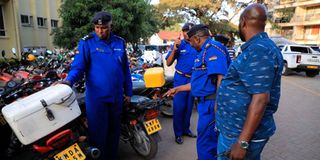The urgency of bodaboda reforms

Police officers inspecting impounded motorbikes at Central Police Station in Nairobi on March 8, 2022 following a crackdown on errant boda boda operators.
What you need to know:
- Of the estimated 2.4 million boda-boda operators, more than 60 per cent are below 35 years.
- Their 22 million daily trips cater for the next meal, school fees, health and other budgets.
As I left the Kenyatta International Convention Centre auditorium on Wednesday after a meeting with boda boda operators, a young man handed me a note with a request to contact him once I had read it.
In it, he had detailed his tribulations. He is an orphaned university student. A scholarship had seen him through high school and the beginner’s years at university. But Covid-19 restrictions forced his sponsor’s business to close down and he thus risked dropping out.
However, working as a hired boda-boda rider, he has been able to save a little money to continue with his studies, though his fees are in arrears. His thirst for education waters his indomitable spirit, ride by ride. My family and I intend to do something about his situation.
His story resonates with many others. Of the estimated 2.4 million boda-boda operators, more than 60 per cent are below 35 years. Their 22 million daily trips cater for the next meal, school fees, health and other budgets. Working with an average cost of Sh50 per ride, it easy to see why the Sh1.2 billion daily revenue sector is so important to our economy.
Bringing the sector to order is, therefore, a priority. The public anger that greeted last week’s incident on Wangari Maathai Road speaks to a collective concern. It encapsulates the rot that we must confront as a country.
Statistics from the National Police Service and the National Transport and Safety Authority show that last year, for example, 1,270 people perished in motorcycle accidents. The figure for 2020 was 1,136, and 728 in 2019. There were 591 deaths in 2018 and this year, 251 people have already died in motorcycle accidents compared to 214 people in a similar period last year!
Motorcycle accidents
Compounding the trend is motorcycles’ over-representation in the causes of death to pedestrians. Last year, our roads claimed 175 more people than the 1,383 lost in 2020. With 50 more pedestrians killed this year than the 246 killed at the same time last year, 2022 threatens superior road carnage unless we act decisively to tame contributing factors.
Our health sector is reeling under the burden of motorcycle accidents’ victims. Dedicated wards for boda boda victims are a common feature. The severity and delicateness of these injuries demand complicated and costly care. Top doctors and niche medical personnel have their hands full due to avoidable accidents. Health schemes are depleted and medical harambees are as common as families impoverished by hospital bills. Promising futures are shattered by maiming of people in the prime of productivity.
Motorcycles affordability is a bitter-sweet concern. The government’s waiver of taxes and access to credit have made them a ubiquitous sight. The rush to ride them without adequate training is fodder for unfunny jokes. Cases abound of training that amounts to a few laps in a football pitch in the morning and by evening, the ‘trainee’ is ferrying passengers!
We must cut off the link between motorcycles and crime. Lax regulations have seen contract killers, drug peddlers, robbers, rapists, con artists and petty thieves establish fiefdoms in the sector. Boda-boda riders have also featured in cases of political thuggery linked to the August 9 elections.
The boda-boda task force appointed in 2019 established that more than 65 per cent of riders are not insured. Only 30 per cent of the riders have undergone training in a registered driving school! Minimum and maximum age restrictions, health limitations and other safety conditions are non-existent. The task force attributed this to a weak regulatory regime and recommended a radical overhaul of the sector. But the political class sabotaged the reform by inciting resistance by the operators.
Isolate rogue elements
In consultation with genuine boda boda associations, the government is determined to get it right this time. To isolate rogue elements hiding in the sector, and to protect genuine operators, all riders must be vetted.
The Sh5,800 fee has been waived to encourage mass compliance. In partnership with the ICT ministry, the National Youth Service, State department of Vocational Training and Boda Boda Association, the NTSA is also offering training in motorcycle riding.
Dedicated desks in all 52 Huduma Centres across the country will be set up to expedite the registration process. Successful applicants will be issued with a smart riding licence, which will be linked to the rider’s National Health Insurance Fund account to access medical services especially in case of an accident.
The operators must also join cooperatives, which should in turn keep an updated digital register of their members. This will help in assigning operating zones and tracking movement. It will also help in self-regulation.
A joint inter-ministerial team chaired by Interior PS Karanja Kibicho is already in place to coordinate this exercise. The ministries of Transport, ICT, the Department of Cooperatives, the NPS, NTSA, NYS and the President’s Delivery Unit are represented.
Granted, not everybody will be cheering these reforms, but the benefits we are reaping today after reforms in national exams, school buses’ rules and the digital migration are an enduring vindication that popular is not necessarily right.
The writer is the Interior Cabinet Secretary




